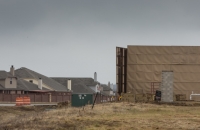New York's highest state court ruled today that local governments have the legal authority to use zoning to bar oil and gas drilling, fracking and other heavy industrial sites within their borders. In a 5-2 decision, affirming the rulings of three lower courts, the justices dismissed challenges to fracking bans created by two towns, Middlefield and Dryden.
The case has been closely watched by the oil and gas industry in the Marcellus region and nationwide. Over 170 towns, villages and cities in New York state have crafted local moratoria or bans on fracking. Dozens more towns are expected to enact moratoria in the wake of this ruling, according to Earthworks, one of the public interest groups whose attorneys worked on the case.
Nationwide, nearly 500 local governments have enacted measures against fracking, according to Food and Water Watch which tracks local control actions, including towns in Texas, West Virginia, Pennsylvania, Colorado and California, each of which have been the focus of recent shale rushes.
The oil and gas industry had argued that allowing local control over fracking risked creating a patchwork of rules in different municipalities. Environmental groups countered that the rights of local communities to control development within their borders trumped those concerns, and that local governments had the clear legal authority to decide how development could proceed.
“On the one hand, you're saying yes, we should have a comprehensive strategy to deal with such an important issue to our state – energy,” Chief Judge Jonathan Lippman explained when the cases were argued before the court on June 3. “And on the other hand, municipalities believe (they can) determine how they're going to live. They want some voice in how they live.”
Today, less than a month later, the court's majority decided in favor of local control. “The towns both studied the issue and acted within their home rule powers in determining that gas drilling would permanently alter and adversely affect the deliberately-cultivated, small-town character of their communities,” the New York Court of Appeals wrote in its majority ruling.



























